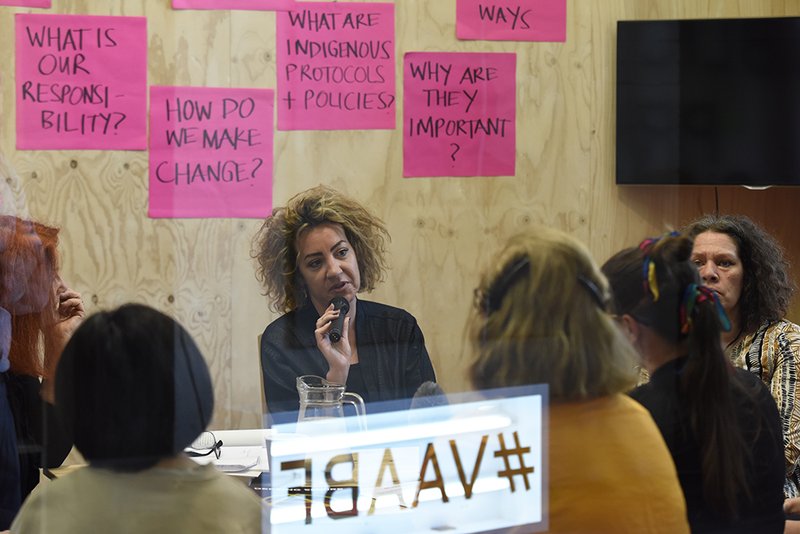NAVA Book Club
NAVA’s Book Club, as part of Artspace Sydney’s Volume 2017 I Another Book Fair, invited people to connect and discuss Aboriginal and Torres Strait Islander protocols, policies and rights.
NAVA’s Book Club, as part of Artspace Sydney’s Volume 2017 I Another Book Fair, invited people to connect and discuss Aboriginal and Torres Strait Islander protocols, policies and rights.

What actions do we need to take to ensure Indigenous artists’ rights are protected?
What do protocols mean?
How are they enacted or implemented to protect Indigenous peoples' rights, especially when the law does not?
How do critical Indigenous methodologies change the ways we work?
Across Friday 13 and Saturday 14 October 2017, NAVA hosted its first Book Club event to discuss Indigenous protocols, current policies, methodologies and actions to take to respect the rights of Aboriginal and Torres Strait Islander artists.
Gabrielle Sullivan, CEO Indigenous Art Code and Bibi Barba Arts Law's Artist in the Black Coordinator, outlined the current activities of the Fake Art Harms Culture campaign, the importance of writing submissions to the current Inquiry into inauthentic Aboriginal ‘style’ art and other ways we can contribute to a more ethical arts environment. Fake art is harmful, we cannot forget this. As arts workers, consumers and advocates there is a responsibility to make sure these practices do not continue and that businesses are accountable. Responding to the current Parliamentary Inquiry is important, but so is being informed to ensure dealers, agents and producers are acting transparently, ethically and with respect to artists and their work.
How do we make change?
What protocols and policies exist?
What are our responsibilities as artists and arts workers
How do we create the future that we want?
First Nations artists, thinkers and arts workers came together to share their process for developing and implementing policies, understanding the diversity of protocols and to identify meaningful pathways for, to quote Nadeena Dixon ‘actually doing shit’. It was a discussion that traversed cultural business, the importance of written and visual communication, the differences between experiences, the publications that have informed practice and the importance of following the heart instead of the intellect.
Doreen Mellor suggested that perhaps what we need is more regular, quiet and powerful discussions that grow with clarity and people over time. NAVA Book Club may be the first of many gatherings to open spaces for both conversations and actions.
By being present in our bodies, recognising and meeting our obligations with respect and openness and privileging the multiplicity of experiences that make us human, this becomes the pathway for exchange to happen.